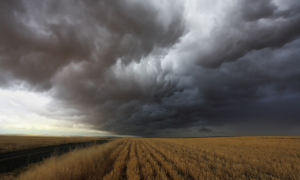Unless you have been completely isolated from the news, you are aware that a volcanic eruption in Iceland brought air traffic to and from Europe to a halt over the past week. Although that has caused great inconvenience for a number of travelers, including heads of state who wanted to attend the funeral of the Polish president and his wife who were tragically killed in a plane crash in Russia, it also seriously affected some supply chains [“Airfreight put under a cloud as crisis forces logistics rethink,” by Robert Wright, Financial Times, 19 April 2010]. Wright reports:
“Businesses that rely on just-in-time airfreight across Europe are examining different mixes of air, ship and truck as they seek to minimise the commercial damage from the flight ban across much of northern Europe. The electronic and pharmaceutical industries are among the worst hit by the lack of air transport, and there are likely to be shortages of some perishable goods, including cut flowers and premium vegetables. Businesses look set to turn to the options in increasing numbers the longer the disruption … continues. The crisis is also likely to encourage the recent rise in the cost of container shipping even further.”
I’m willing to bet that among all of the contingency plans discussed by air carriers prior to this year’s operations, a disruption caused by a volcanic eruption was not high on the list — if it was on the list at all. Events like the volcanic eruption are often referred to as “acts of God.” A.P. Herbert defines an act of God “as something which no reasonable man could have expected.” Certainly reasonable men could have anticipated delays caused by environmental conditions; but the extent of the delay caused by volcanic ash probably exceeded any of their expectations. Wright continues:
“Much of the attention so far about the economic effects of the flight problems has been on food supply. However, those working in the industry said most food imported into Europe continued to be moved by either specialist refrigerated ships or on container vessels. Mr Sidler said that, from European consumers’ point of view, the worst-affected perishables would be cut flowers and a small number of premium vegetables and fruits, such as runner beans grown in tropical Africa. ‘It may mean some scarcity, but nothing that would really disrupt people’s lives,’ he said.
What Wright meant, of course, was that people living in Europe with no need to travel weren’t going to experience much disruption. For the people scheduled to fly on the roughly 70,000 flights that were canceled, there was serious disruption to their lives. As far as the supply chain, the most deleterious effect was on suppliers in developing countries. Wright explains:
“The consequences would be far more serious, [Alan Braithwaite, chairman of LCP Consulting, a logistics consultancy,] said, for small specialist producers in developing countries, some of which were dependent on exporting by air. ‘If you’re producing and packaging pineapples in Ghana, you have rotting pineapples and no way to mitigate that in the short term at all,’ he said. However, the consequences in Europe would mostly be more serious for makers of electronic products that used microchips, SIM cards for mobile telephones and other airfreighted components, Mr Sidler said. There would also be problems for some pharmaceutical companies. ‘You will have very, very soon a situation where demand is outstripping supply,’ he said. The shift to sea freight would exacerbate a recent increase in the price of shipping containers, Mr Sidler added. The sector took out capacity following a sharp fall in trade volumes last year, meaning that customers have already been struggling this year to find space on ships on some routes.”
To learn more about the affect that supply disruptions are having in the developing world, read “With Flights Grounded, Kenya’s Produce Wilts,” by Jeffrey Gettleman, New York Times, 20 April 2010. For more information about bottlenecks in the shipping industry, read my post entitled Port Efficiency and Secure Information Sharing are Keys to International Trade. The disruption to air traffic over Europe has been so prevalent chances are you know someone who has been affected by it. In my case, I know that Lora Cecere, a supply chain analyst, was caught in the disruption. I know this because she wrote about it in her blog [“Ashes got me Thinking“]. Lora not only lets us know how it affected her personally, but she provides insights the experience has given her about the supply chain. She writes:
“I had never heard of it. I still struggle to say it. However, on Friday [16 April], Iceland’s Eyjafjallajökull volcano taught some valuable lessons. The eruption of Eyjafjallajökull (pronounced ay-yah-FYAH-plah-yer-kuh-duhl, according to the Associated Press) began on Wednesday, and resulted in the cancellation of more than 63,000 flights by Sunday. One of them was mine. The economic ripples are quickly translating into supply chain realities. They will fill the press for weeks. They will become the new stories for the supply chain risk management text books; but before this happens, I want to share. In the middle of this chaos, I had several Eureka moments. Here I tell my story, what I learned, and why I think that it is important.”
Lora travels a lot and is, therefore, more savvy than the average traveler. Her insights begin with her struggle to find alternative flights to Europe. She explains what this taught her about the supply chain:
-Volatility versus Surprise: While most of the supply chain risk management plans focus on the management of the supply chain through periods of volatility, there is very little writing on navigating a supply chain through a period of surprise. Supply chain risk in a period of surprise is VERY different than management of the supply chain through volatility. This was clearly a surprise. Unlike a hurricane, there was no early warning system, no pre-planned drills, or carefully crafted procedures. The reason? Who would ever have thought that an Iceland volcano would have such a profound affect? When a surprise happens, the need for the immediacy of data increases. In this case, I found that twitter was my NEW best friend. This was my Eureka moment.
-Immediacy of Information. As I descended into the din of chaos at JFK airport in New York, I was able to get real-time pictures, updates, and recommendations. My Tweetdeck was quickly broadcasting messages on hashtags #ashtag and #EAU. Both tags were actively tweeting information from around the world, from people that I did not know, and with incredible accuracy. I knew that my flight to Milan would not fly two hours ahead of the notification from the Delta medallion service desk. As the Milan airspace closed, I knew that the Barcelona airport might be a possibility and I had the right flights to ask for. The information was both more accurate and immediate then what I could get on the ground from customer service agents. As the day progressed, I became a BELIEVER.
I confess that Lora opened my eyes to Twitter possibilities that I had not appreciated before. Frankly, I’m not much interested in the daily activities of rock stars, Hollywood celebrities, and angry politicians — and that’s pretty much what I thought Twitter was about [see my post entitled All Atwitter]. In that post, I concluded, “I do see … how Twitter could be a useful customer relations tool and an important component of a public warning system (like on a college campus). I’m sure that as more people and companies experiment with the technology they will find other uses as well.” Lora has certainly proven that supposition to be true and she goes on to report “why it matters” to those in the supply chain business.
“As a supply chain risk manager, the first step that I would take in planning for a surprise is to be sure that EVERYONE understands the power of twitter. Establish the hash tags early, and empower employees to actively tweet information. Embrace social media into your field readiness plans. … I am now rescheduled to fly to Milan on Tuesday. I will consult twitter before I go to the Delta website to check flight status. I will continue to monitor #ASHTAG for information throughout the day tomorrow, and if I get stuck in Europe, you will find me tweeting to look for a hotel. Wish me luck on getting to Europe. Next week is sure to be a mess. I wish you luck sorting through the issues, finding out where your freight is, and how to expedite it. You may want to try twitter. Consult the #ashtag, it may hold some promise for you in the week of chaos as well.”
I’ve always insisted that if you put new technology into peoples’ hands they will make more of it than even its creator imagined. As supply chain managers scramble to keep their products moving and their companies afloat, Lora has explained a new tool they place in their kit. Connectivity, when used correctly, makes good things happen. And, by the way, good luck Lora! I hope you made it Europe and find your way safely back to the U.S.




